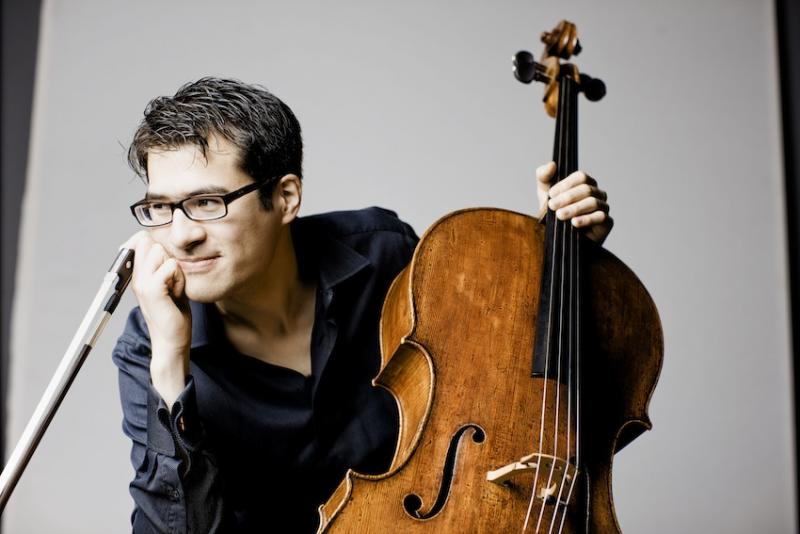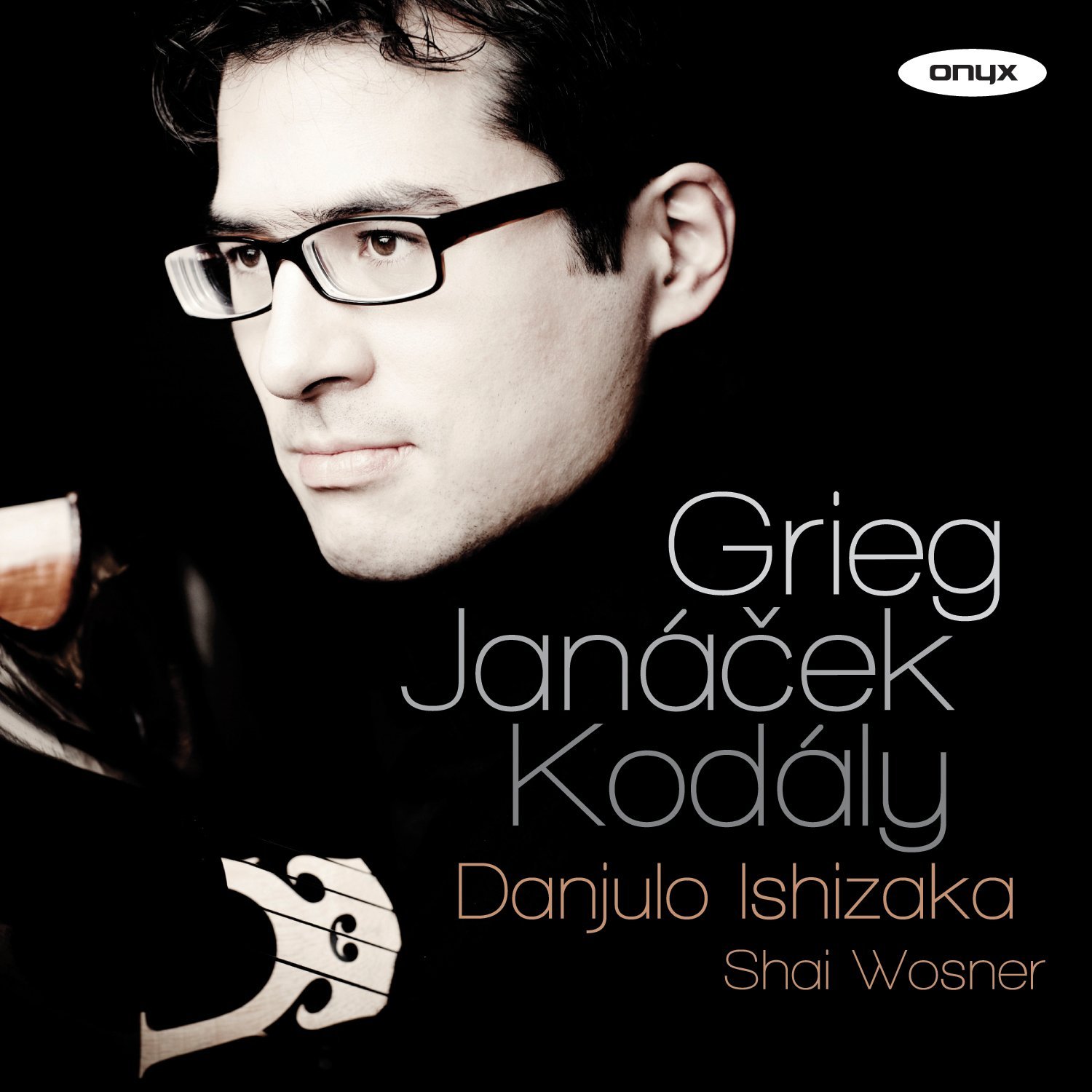Classical CDs Weekly: Adams, Haydn, Danjulo Ishizaka | reviews, news & interviews
Classical CDs Weekly: Adams, Haydn, Danjulo Ishizaka
Classical CDs Weekly: Adams, Haydn, Danjulo Ishizaka
Cinematic contemporary music, classical piano concertos and folk-inspired cello sonatas


There's a lot going on in John Adams's City Noir. Ideas come thick and fast, and for every few that are skilfully developed, another gets cast aside. The composer's description of this three movement symphony as “the soundtrack to an imagined noir film” fits nicely – though it's busier and more elaborately scored than most soundtracks. Best to think of noir in terms of subject matter rather than colour. Much of City Noir gleams and dazzles. We get blinding sunlight instead of dark alleyway. Adams's language alludes as much to the work of emigre European composers working in Hollywood as it does to jazz; expressionist harmonies jostle with pounding rhythmic ostinati. David Robertson's St Louis Symphony are sensationally good, and Nonesuch's rich recording is wonderfully immersive. The third movement, "Boulevard Night", is the most entertaining; its Latin-tinged closing minutes probably the most exciting thing you'll hear this year. A wonderful piece, which also had the welcome side effect of returning me to Stravinsky's similarly noirish Symphony in Three Movements.
City Noir's fiendish sax solos are performed by Timothy McAllister – whose playing prompted Adams to write his expansive Saxophone Concerto in 2013. McAllister's tone is distinctive: most classical composers writing for the instrument expect a clean, manicured sound, which McAllister delivers – there's plenty of louche smoothness. But he doesn't shy away from grittiness when it's needed. The agility and flexibility are stunning; I keep replaying a dazzling passage near the end of the first movement. Perhaps the first two movements are a little overlong, though Adams's extended bravura finale passes in the blink of an eye. Why can't all contemporary composers write music that's this entertaining?
Haydn's name used to carry so much weight that unscrupulous publishers posthumously promoted scores which weren't actually by him at all. The three keyboard concertos on this disc are indisputably the genuine article – those in F and G were probably written for harpsichord, and the D major could also be played on the fortepiano. Haydn wasn't a virtuoso player and these concertos aren't phenomenally difficult. Jean-Efflam Bavouzet's readings are as effervescent as Marc-André Hamelin's superb Hyperion performances. You'd happily take either to a desert island; the one slight difference is the slightly weightier accompaniment provided by Gabor Takács-Nagy's excellent Manchester Camerata, complete with optional horns in the F major concerto – slightly richer in tone than Bernard Labadie's lean, athletic Violons du Roy. My advice would be to buy both discs.
The G major work is the revelation here, Bavouzet transforming Haydn's unfussy, direct solo lines into pure gold. The piano's crisp, witty opening statement is typical, while lacking nothing in terms of human warmth. The manic Rondo is pure joy. Bavouzet's eloquent sleeve note is a good read, citing Austrian pianist Friedrich Gulda's performance of the slow movement of Mozart's K467 concerto as a major inspiration. Bavouzet has fun with the F major's elegant Largo cantabile – the right hand dazzlingly flexible over a well-behaved bassline. Purists may wince at some cheekily inauthentic harmonies in the cadenza, but you suspect that Haydn would have approved. Which leaves the more familiar D major concerto. It's a predictably entertaining traversal; Bavouzet and Takács-Nagy taking another idiomatic liberty seconds before the close of the last movement. This will hopefully have you giggling and wanting to listen to the whole thing again. It worked for me.
Janáček's Pohádka was the composer's first published chamber work; an exquisite three-movement fairy tale for cello and piano, inspired by a Russian poem. It predates Janáček's hyperactive late period, but it's still wholly characteristic. Those nagging ostinati figures couldn't have been written by anyone else, and the melodies alternately soar or sound like brusque dialogue. Cellist Danjulo Ishizaka knows that he's telling us a story, drawing us in at the start of each short movement. He's superbly accompanied by Shai Wosner. The work's close is magical, stealing away into silence – as if the narrator's quietly closing the book and blowing out the candles. As a bonus we also get Janáček's brief, stormy Presto, presumed to be one of two movements excised from Pohádka. Grieg's 1883 Cello Sonata is another delight, and proof that Grieg's talent wasn't limited to composing exquisite miniatures. It's a tautly structured, brooding piece, and Ishizaka and Wosner capture the piece's volatility – Wosner's rippling accompaniment to the opening theme is nicely done, as is the understated introduction to the slow movement.
Ishizaka also gives us a cogent, virtuoso reading of Kodály's magnificent, soulful Solo Cello Sonata. This is a terrifying piece to play, a work which, in Ishizaka's words, “demolishes the limits of what was thought technically possible on the cello at the time.” The last movement's pyrotechnics are dazzling, but the sonata's sparer, haunted passages are equally effective – the slow movement's dark opening is marvellous in Ishizaka's hands. A superb recital.
Explore topics
Share this article
The future of Arts Journalism
You can stop theartsdesk.com closing!
We urgently need financing to survive. Our fundraising drive has thus far raised £33,000 but we need to reach £100,000 or we will be forced to close. Please contribute here: https://gofund.me/c3f6033d
And if you can forward this information to anyone who might assist, we’d be grateful.

Subscribe to theartsdesk.com
Thank you for continuing to read our work on theartsdesk.com. For unlimited access to every article in its entirety, including our archive of more than 15,000 pieces, we're asking for £5 per month or £40 per year. We feel it's a very good deal, and hope you do too.
To take a subscription now simply click here.
And if you're looking for that extra gift for a friend or family member, why not treat them to a theartsdesk.com gift subscription?
more Classical music
 London Choral Sinfonia, Waldron, Smith Square Hall review - contemporary choral classics alongside an ambitious premiere
An impassioned response to the climate crisis was slightly hamstrung by its text
London Choral Sinfonia, Waldron, Smith Square Hall review - contemporary choral classics alongside an ambitious premiere
An impassioned response to the climate crisis was slightly hamstrung by its text
 Goldberg Variations, Ólafsson, Wigmore Hall review - Bach in the shadow of Beethoven
Late changes, and new dramas, from the Icelandic superstar
Goldberg Variations, Ólafsson, Wigmore Hall review - Bach in the shadow of Beethoven
Late changes, and new dramas, from the Icelandic superstar
 Mahler's Ninth, BBC Philharmonic, Gamzou, Bridgewater Hall, Manchester review - vision and intensity
A composer-conductor interprets the last completed symphony in breathtaking style
Mahler's Ninth, BBC Philharmonic, Gamzou, Bridgewater Hall, Manchester review - vision and intensity
A composer-conductor interprets the last completed symphony in breathtaking style
 St Matthew Passion, Dunedin Consort, Butt, Queen’s Hall, Edinburgh review - life, meaning and depth
Annual Scottish airing is crowned by grounded conducting and Ashley Riches’ Christ
St Matthew Passion, Dunedin Consort, Butt, Queen’s Hall, Edinburgh review - life, meaning and depth
Annual Scottish airing is crowned by grounded conducting and Ashley Riches’ Christ
 St Matthew Passion, Irish Baroque Orchestra, Whelan, St Patrick’s Cathedral, Dublin review - the heights rescaled
Helen Charlston and Nicholas Mulroy join the lineup in the best Bach anywhere
St Matthew Passion, Irish Baroque Orchestra, Whelan, St Patrick’s Cathedral, Dublin review - the heights rescaled
Helen Charlston and Nicholas Mulroy join the lineup in the best Bach anywhere
 Kraggerud, Irish Chamber Orchestra, RIAM Dublin review - stomping, dancing, magical Vivaldi plus
Norwegian violinist and composer gives a perfect programme with vivacious accomplices
Kraggerud, Irish Chamber Orchestra, RIAM Dublin review - stomping, dancing, magical Vivaldi plus
Norwegian violinist and composer gives a perfect programme with vivacious accomplices
 Small, Hallé, Wong, Bridgewater Hall, Manchester review - return to Shostakovich’s ambiguous triumphalism
Illumination from a conductor with his own signature
Small, Hallé, Wong, Bridgewater Hall, Manchester review - return to Shostakovich’s ambiguous triumphalism
Illumination from a conductor with his own signature
 LSO, Noseda, Barbican review - Half Six shake-up
Principal guest conductor is adrenalin-charged in presentation of a Prokofiev monster
LSO, Noseda, Barbican review - Half Six shake-up
Principal guest conductor is adrenalin-charged in presentation of a Prokofiev monster
 Frang, LPO, Jurowski, RFH review - every beauty revealed
Schumann rarity equals Beethoven and Schubert in perfectly executed programme
Frang, LPO, Jurowski, RFH review - every beauty revealed
Schumann rarity equals Beethoven and Schubert in perfectly executed programme
 Levit, Sternath, Wigmore Hall review - pushing the boundaries in Prokofiev and Shostakovich
Master pianist shines the spotlight on star protégé in another unique programme
Levit, Sternath, Wigmore Hall review - pushing the boundaries in Prokofiev and Shostakovich
Master pianist shines the spotlight on star protégé in another unique programme
 Classical CDs: Big bands, beasts and birdcalls
Italian songs, Viennese chamber music and an enterprising guitar quartet
Classical CDs: Big bands, beasts and birdcalls
Italian songs, Viennese chamber music and an enterprising guitar quartet
 Connolly, BBC Philharmonic, Paterson, Bridgewater Hall, Manchester review - a journey through French splendours
Magic in lesser-known works of Duruflé and Chausson
Connolly, BBC Philharmonic, Paterson, Bridgewater Hall, Manchester review - a journey through French splendours
Magic in lesser-known works of Duruflé and Chausson

Add comment